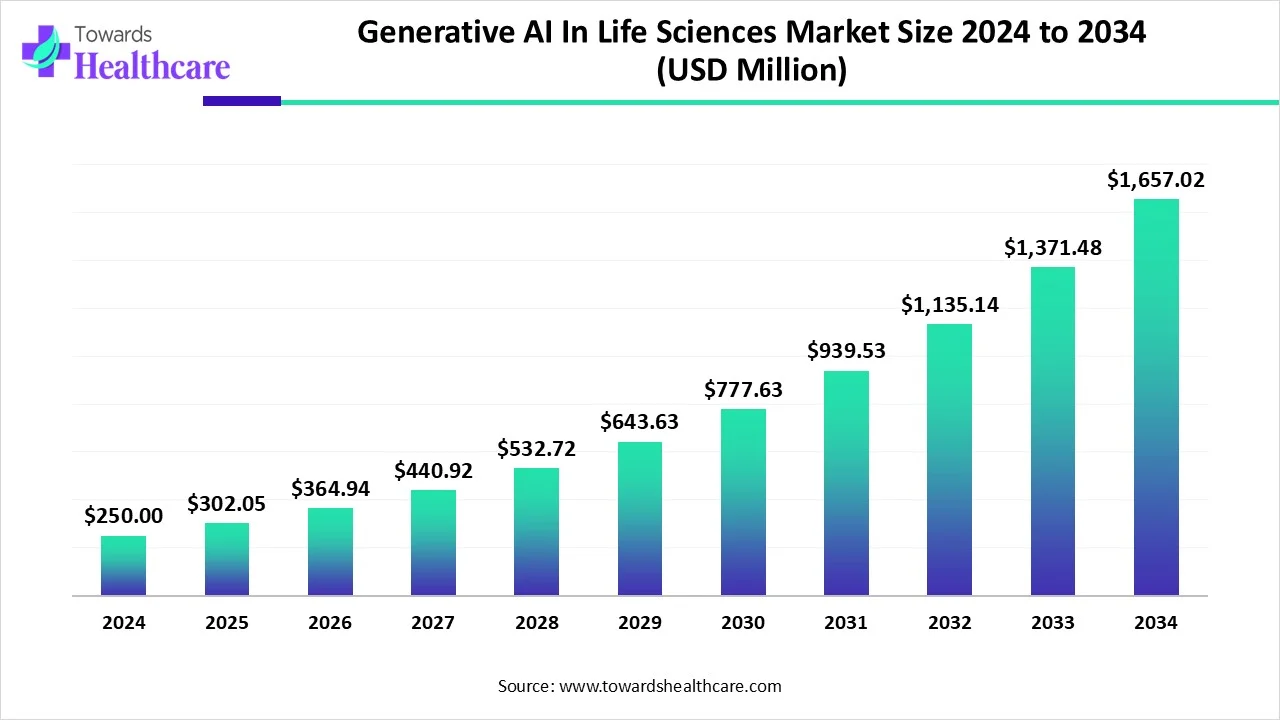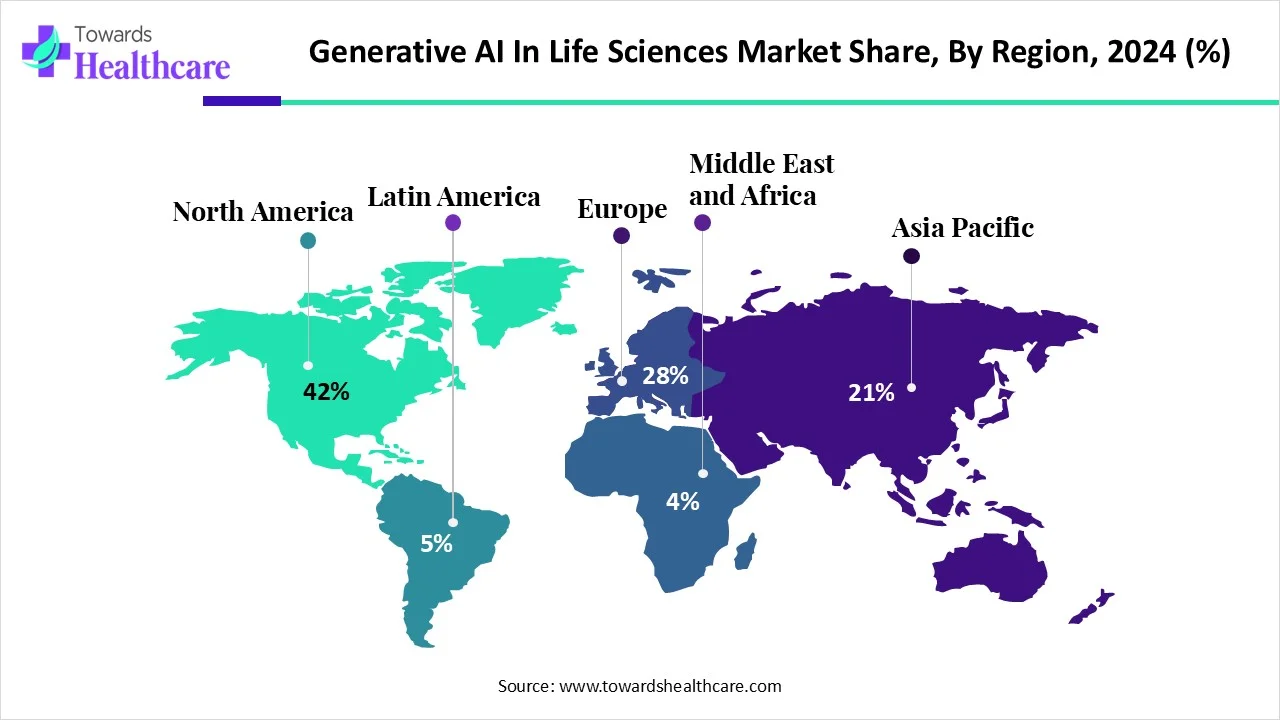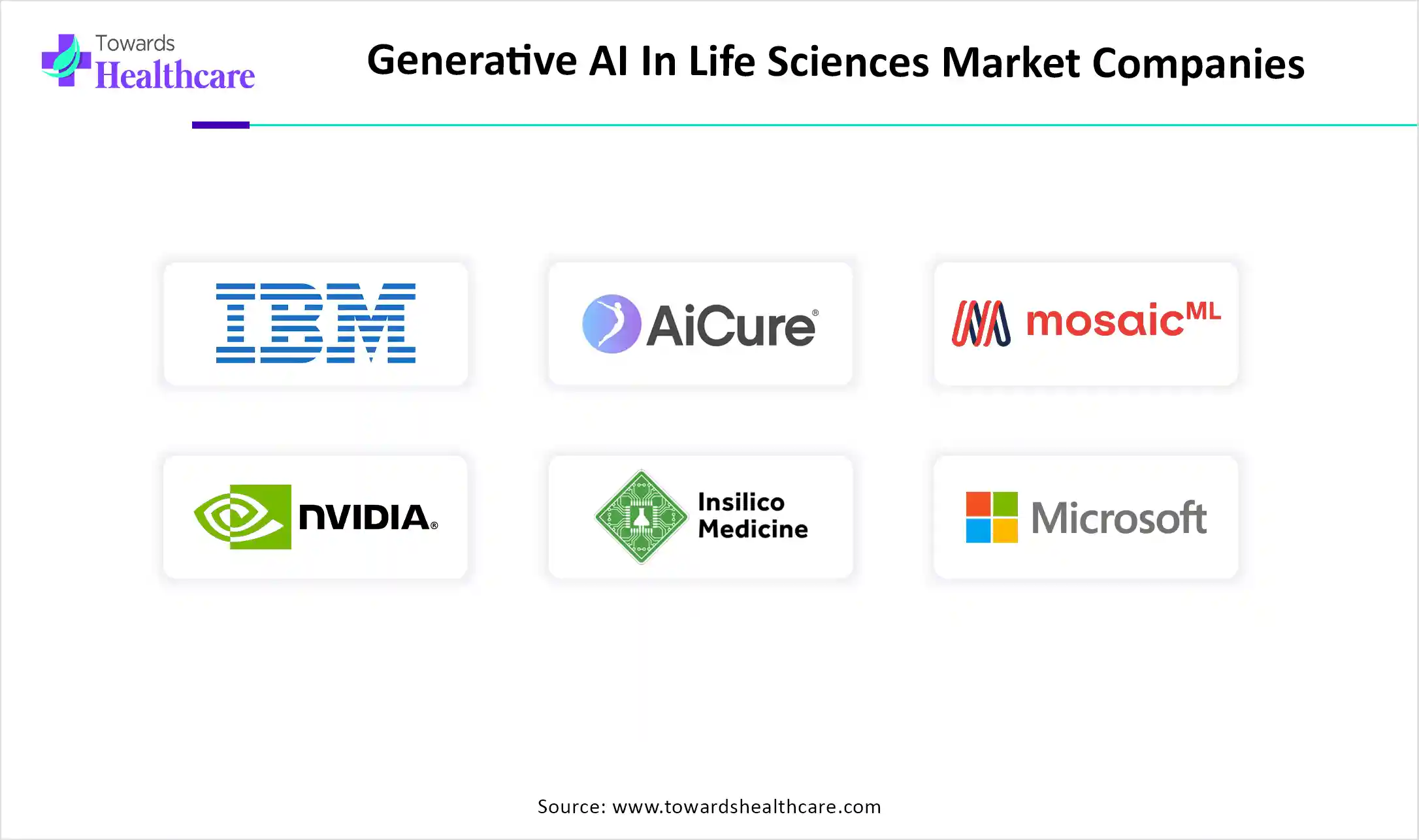January 2026

The global generative AI in life sciences market size is calculated at US$ 302.05 million in 2025, grew to US$ 364.94 million in 2026, and is projected to reach around US$ 1,657.02 million by 2034. The market is expanding at a CAGR of 20.82% between 2025 and 2034.

The global generative AI in life sciences market is impacted by the growing demand for personalized medicine, the need to boost drug development, and the integration of AI with breakthrough technologies for laboratory digitalization. Nowadays, this market has numerous opportunities for the future are identification of potential drug candidates in drug discovery, analysis of vast datasets of patient information and trial designs in clinical trials, and also in diagnostic areas as they improve efficiency, reduce cost, and provide more precise results.
| Metric | Details |
| Market Size in 2025 | USD 302.05 Million |
| Projected Market Size in 2034 | USD 1,657.02 Million |
| CAGR (2025 - 2034) | 20.82% |
| Leading Region | North America share 42% |
| Market Segmentation | By Technology, By Application, By Region |
| Top Key Players | IBM Corporation, AiCure LLC, MosaicMLNVIDIA, Insilico Medicine Inc., Writer, HealthArk, Indegene, Microsoft |
By using AI algorithms in life sciences develops new data, including virtual compounds, images, or text, is developed to escalate drug discovery, optimize clinical trials, and improve patient care. In the present era, the rising approaches in drug discovery, a growing adoption of personalized medicines, and increasing efforts to streamline processes are driving the generative AI in life sciences market growth. Basically, the generative AI is employed in novel drug target identification, which more rapidly supports in analysis of a huge amount of data and estimating efficient therapeutic applications. As well as, GenAI enables designing and screening potential drug candidates more effectively, resulting in a faster drug discovery process.
Accelerating Demand in Different Areas and Raising Patient Care
The generative AI in life sciences market is experiencing major growth driven by the growing utilization of GenAI in numerous areas. As Gen AI supports in analysis of a large volume of datasets of chemical compounds, biological interactions, and genetic data in drug discovery, it can optimize clinical trial designs, increase patient recruitment, and simplify the data analysis. Along with this, GenAI supports treatment strategies to develop personalized medicines and anticipates the disease progression in patients by monitoring patient health, resulting in an enhancement in patient care.
Merging Concerns Related to Data Privacy and Security
As GenAI depends on huge datasets, which often comprise sensitive patient information, leading to a rise in risks to data privacy and security. Although its models assume biases from the training data, they increasingly result in wrong or unfair outcomes. To prevent bias, careful data selection and model training are needed.
Escalating Approaches in Drug Discovery and Clinical Trials
In drug discovery, GenAI assists in the identification of new drug targets, estimation of protein structure, and boosting preclinical research. This also supports simplifying clinical trial design, patient recruitment, and data analysis, which results in rapid and more effective clinical trials. Moreover, GenAI enables the analysis of patient data to develop customized treatment strategies, enhancing outcomes and minimizing side effects.
By technology, the novel molecule generation segment held the dominant revenue share of the market in 2024. The dominance occurred due to GenAI enabling transformation in drug discovery by designing novel molecules with specific properties. This carried through the application of AI models, which can create novel molecular structures, anticipate their properties, and even design molecules that are directly employed in drug development. Ultimately, lessens expenses, enhances drug discovery, and optimizes the process effectiveness.
By technology, the protein sequence design segment is expected to grow at a significant rate during the forecast period in the generative AI in life science market. The segment is showing significant growth due to GenAI transforms protein sequence design, providing a robust novel approach to engineering proteins with certain characteristics and functions, such as those related to growth factors, and else therapeutic targets. Overall, it escalates the process of evolving novel biotherapeutics.
By application, the drug discovery segment dominated generative AI in life science market, due to the rising acquisition of generative AI technologies and the potential for rapid, more potential, and inexpensive drug development. AI, especially generative AI, is revolutionizing drug discovery by providing the design of novel molecular structures, enhancing drug candidates, and accelerating the comprehensive drug development process.
By application, the clinical trial segment is expected to grow fastest in the upcoming years. GenAI algorithms enable automation in tasks, analysis of huge volume datasets, and the determination of patterns, resulting in faster and more effective clinical trials. It also enhances trial design, assumes outcomes, and clarifies eligibility criteria, leading to strong and correct results.

North America held the largest revenue share of the generative AI in life science market share by 42% in 2024. The respective market growth is propelled by the substantial public and private investment in AI R&D, along with a beneficial regulatory environment that boosts innovation. North America is a hub for global technology companies and research institutions, impelling the development and use of generative AI in life sciences.
In the US, GenAI is widely used in the generation of amenable and attractive content for numerous purposes, such as clinical trial reports, marketing materials, and patient education resources. They are also emphasizing facilitation by Gen AI in the creation of practical simulations for healthcare professionals, providing them to cater new skills and accelerating their knowledge in a safe and effective environment.
For instance,
The government of Canada has taken initiative with a national AI strategy and is enabling funding to assist AI startups and encouraging reskilling. Also,
For instance,
In May 2025, Quantiphi, an AI-first digital engineering company, launches its Phi Labs by Quantiphi, the formal identity of Quantiphi's long-standing Research and Development (R&D) hub, highlighting real-world business risks through advanced AI solutions. (Source- PR Newswire)
The generative AI in life science market is driven by the rising adoption of GenAI in clinical trials, to improve clinical trial processes, like superior trial design, patient selection, and data management. As well as, ASAP has acquired generative AI in personalized healthcare solutions to analyze huge datasets to detect individual patient needs and customize treatments.
In China, the genAI is revolutionizing rapidly in the life sciences areas, propelling novel creation in drug discovery, clinical trials, and personalised medicine. China is the chief player in applications of GenAI in patenting drugs, especially compound screening, considering the country’s aim on pharmaceutical innovation and AI in healthcare.
Japan is experiencing significant expansion due to Japanese pharmaceutical companies are utilising GenAI in the analysis of a huge volume of datasets, estimating outcomes, and developing novel therapies. This kind of AI is highly applied to simplify administrative tasks, optimize resource allocation, and enhance hospital workflows.
The European generative AI in life science market is impacted by the increasing adoption of GenAI in medical education to develop interactive simulations and educational resources for medical professionals and students. Although in enabling automative tasks, analysis of data is strongly, and creates new insights, overall escalates research and development efforts.
The major growth is impelled by the application of GenAI in the analysis of vast datasets of patient information to achieve highly precise diagnoses and personalized treatment plans, particularly in difficult cases. Along with this, simplifying regulatory approaches and ensuring compliance with industry references, and cost-effectiveness in drug discovery and clinical trials, enables an advantageous environment for market growth.
The government of the UK enabled substantial financial commitments to GenAI over public services, such as healthcare, with alliances with the NHS and AI pilots in diagnostics and personalized medicine. Life sciences companies are diligently collaborating with AI companies to develop novel candidates and services.
Latin America is expected to grow at a notable CAGR in the generative AI in life sciences market in the foreseeable future. The burgeoning life sciences sector and the increasing adoption of advanced technologies augment the market. People are becoming aware of applications of GenAI in the life science sector. Government agencies launch initiatives to adopt digitization and provide funding. A recent “2025 Generative AI in Professional Services Report” reported that 85% of Latin American respondents want GenAI to integrate into their work.
The Mexican government is actively supporting the development of a comprehensive legal framework for GenAI, with ongoing public policy discussions and numerous legislative proposals. There are around 111 life science startups in Mexico, of which 20 startups are funded.
The Brazilian government launched the “Brazilian Artificial Intelligence Plan 2024-2028” to strengthen its position as a global leader in AI by promoting sustainable and socially-oriented technologies across various sectors. The plan allocates 23.03 billion reais (US$4 billion) over four years.
The global life science market size is calculated at US$ 88.2 billion in 2024, grew to US$ 98.63 billion in 2025, and is projected to reach around US$ 269.56 billion by 2034. The market is expanding at a CAGR of 11.82% between 2025 and 2034.


By Technology
By Application
By Region
January 2026
January 2026
January 2026
January 2026